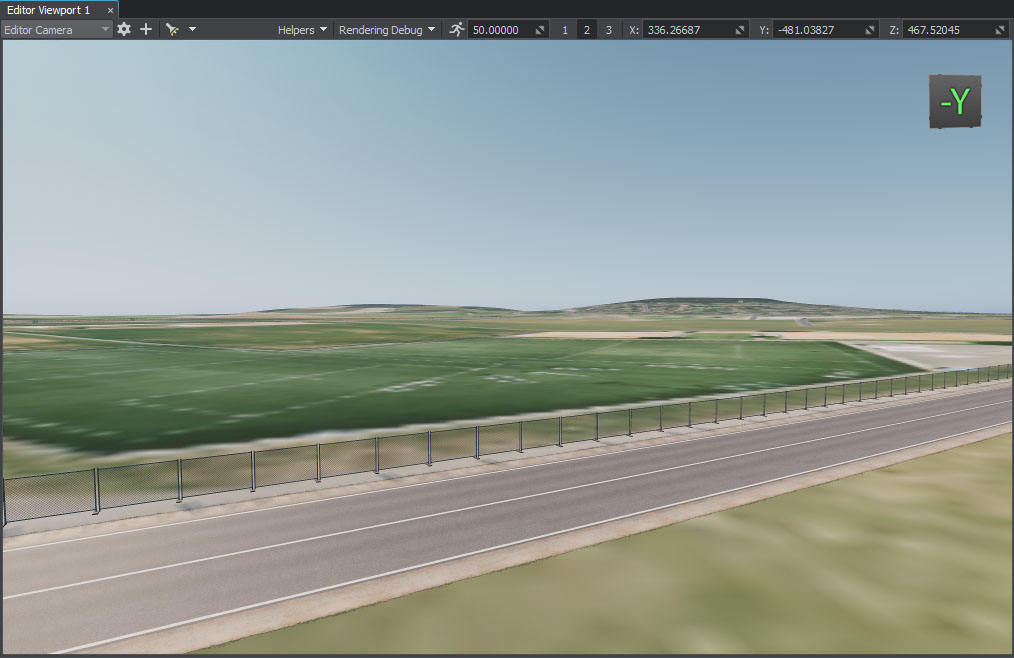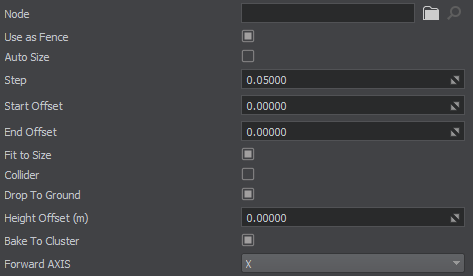点对象参数
Houses, landmarks, and other such objects are placed at specific points of the terrain. Two shape types can be selected and used for point object placement:房屋、地标和其他类似的物体被放置在地形的特定点上。两种形状类型可以被选择并用于点对象的放置:
-
Point — the object is placed at the position specified by the point and oriented the same way as when saved to a *.node file.Point -对象被放置在由点指定的位置,并以与保存到*.node文件时相同的方式定位。

-
Line — the object is placed at the position specified by the first point, while the second point determines the orientation of the object's forward direction vector (positive Y).Line -对象被放置在第一个点指定的位置,而第二个点确定对象的前进方向向量的方向(正Y)。

The object location and details are retrieved from vector data sources (*.shp and *.geojson assets).对象位置和详细信息是从向量数据源(*.shp和*.geojson资源)中检索的。
Filter settings are described here.过滤器设置描述为 。
Parameters参数#

| Node |
The path to the primary object's *.node file.主对象's *.node文件的路径。 The process of creating an object is described here.这里描述了创建对象的过程 。 注意
Intersections should be enabled for any type of the primary object.应该为任何类型的主对象启用交集。 |
|---|---|
| Use as Fence | Option for lengthy objects such as fences and pipes. When creating point objects, this option should be disabled.选项用于较长的对象,如 栅栏和管道。在创建点对象时,应该禁用此选项。 |
| Autosize |
Autosizing for lengthy objects such as fences and pipes. If enabled, basic objects are stretched and placed with zero-spacing so that bounding boxes of the first and the last basic objects are aligned with start and end points of the line segment respectively.为栅栏和管道等长对象自动调整大小。如果启用,基本对象将被拉伸并以零间距放置,以便第一个和最后一个基本对象的边界框分别与线段的起始点和结束点对齐。
Disabling this option makes the following parameters available:禁用此选项将使以下参数可用: |
| Collider |
Flag indicating if collisions for the generated object are to be detected.标志,指示是否要检测生成对象的碰撞。 注意
Available only for geometry type.只提供几何类型。 |
| Drop To Ground | Flag indicating if the generated object will be aligned with the terrain surface.标志,指示生成的对象是否与地形表面对齐。 |
| Height Offset (m) |
Distance from the terrain surface along the Z-axis, in meters.沿着Z-axis地形表面的距离,在米。 注意
If you see the generated object partially, You can try to increase this value to lift it above the terrain surface.如果您看到了部分生成的对象,您可以尝试增加该值以使其高于地形表面。 |
| Bake To Cluster | If enabled, bakes generated point objects to Mesh Cluster. If disabled, generated objects are added to the world hierarchy as NodeReference objects.如果启用,烘焙生成对象指向Mesh Cluster。如果禁用,生成的对象添加到世界等级NodeReference对象。 |
| Forward Axis | Axis which determines the orientation of the primary object: X, -X, Y, -Y.轴,它决定了主对象的方向:X, -X, Y, -Y。 |
| Split Billboards Length (km) |
This parameter is required if your primary object is a billboard, to control the number of Billboards objects to be generated due to area splitting:如果您的 主要对象 是广告牌,则需要此参数,以控制 Billboards 的数量 由于区域分割而生成的对象:
注意
The maximum number of billboards contained in a single Billboards object is limited to 8000. Thus, the number of generated Billboards objects is also affected by the total number of points, where the Billboards are to be placed. Although Billboards are performance-friendly, generating too many of them may reduce performance.单个Billboards对象中包含的广告牌的最大数量限制为8000。因此,生成的Billboards对象的数量也受点的总数(Billboards放置的位置)的影响。尽管Billboards是性能友好型的,但是生成过多的Billboards可能会降低性能。 |
本页面上的信息适用于 UNIGINE 2.19 SDK.

